Randy Alcorn's Blog, page 190
November 13, 2013
Are aborted children better off because they’ll go straight to Heaven?

In this video interview with EPM staffer Julia Stager, we discuss the question, “Aren’t unborn children better off being aborted so they can go to Heaven, rather than taking the chance they will be raised in homes where they won’t come to faith in Christ?” I also share some more expanded thoughts in the following transcript.
That question really pushes a button with me. I’ve heard it from a number of people and I cringe every time. In fact, years ago I heard it from two pastors on two separate occasions. They were seriously arguing, “Why are you trying to do all this stuff to prevent abortions? Children are better off dying. They’re going to be in Heaven forever.”
They were actually trying to tell me that attempts to save the lives of unborn children may end up sending them to Hell because they’re going to grow up past the age of accountability (a term not used in Scripture, though there might be some truth to it), and then in all probability reject Christ. So if we succeeded in saving their lives, they would probably go to Hell instead of Heaven.
To which I responded, “That is a very cold theological argument!” And, “Do you see any logic like that in the Bible?” Now, do I believe that children are covered by the blood of Christ? I don’t think it’s as easy a question to answer as some people do (who assume children are morally innocent), but, yes, the bottom line is I do believe they are covered by Christ’s blood. (I share more about this in another article.)
What bothers me the most is the people who take the “moral high ground” to justify their failure to try to save the lives of unborn children.
Consider this scenario: You have a child or grandchild who is two years old. If they die today you believe they'll go to Heaven, but if they grow up they may not come to Christ. So what is the best thing you can do today? Kill them? Using the same logic for not saving children dying by abortion, you could make that choice.
Or, suppose I saw a three-year-old little girl about to fall off a cliff. If I save the child’s life, she will likely grow older and may not come to faith in Christ. But if I let her die, she goes to Heaven. What should I do? (That’s how you make a moral quandary out of something that’s completely simple—you try to save the child’s life even if you have to risk your life to do it!)
This whole line of argumentation is repugnant on the face of it, isn’t it? I think it’s every bit as repugnant when used about unborn children as it is about children who are already born.
Satan must just love this whole idea. To demonstrate just how ugly and demonic this “logic” is, consider the following post a commenter left in response to an article on our website. The thought process he uses is seemingly sound but actually utterly deceptive:
(1) Unborn babies do not deserve worse than death by dismemberment.
(2) God does not condemn people to worse than they deserve.
(3) Hell is worse than death by dismemberment.
(4) Therefore, God does not condemn unborn babies to hell.
(5) Hundreds of millions of unborn babies have been aborted.
(6) Had they not been aborted, some of these would have survived to adulthood.
(7) Many of these survivors would not have come to faith in Christ (it is unreasonable to think otherwise).
(8) Adults who do not come to faith in Christ are condemned to hell.
(9) Therefore, if some had not been aborted, they’d have gone to hell.
(10) Therefore, abortion has saved some from hell.
(11) We can correspondingly conclude that abortion saves an unborn baby from the risk of hell.
(12) Hell involves eternal suffering and conscious separation from God.
(13) There is nothing in the earthly life for which it is worth risking eternal suffering and conscious separation from God.
(14) Therefore, abortion is in the unborn baby’s interest.
This apparently seemed logical to the commenter, but it is morally reprehensible. And most importantly, this logic doesn't work with God, who is much smarter than any of us.
When I was two years old, I wandered away from my parents and fell into a swimming pool. It’s my earliest memory. I vividly recall being under the water with my eyes open, and I was terrified. Some stranger whose face I never saw pulled me out of the water. I wonder to this day if it was an angel. In any case, my life was saved, and I’m sure glad!
Scripture says, “Rescue those being led away to death. Hold back those staggering towards slaughter. Speak up for those who cannot speak up for themselves. Defend the rights of the poor and needy” (Proverbs 31:8-9). That’s what God says. (Not "kill them young, or stand by passively and let others kill them, so they'll go to Heaven.")
Look out for theological argumentation that becomes rigid and uncaring. It can be terribly misused, and in this case, it is both thoroughly unbiblical and dishonoring to Christ.

Related Resources
Book: ProLife Answers to ProChoice Arguments
Blog: You May Choose to Look the Other Way, But...
Audio: How can pastors address the issue of abortion in their churches?
photo credit: Insight Imaging: John A Ryan Photography via photopin cc
November 11, 2013
Randy’s book Money, Possessions and Eternity, and Sending Your Treasure on Ahead
Originally published in 1989 and updated in 2000, Randy’s book Money, Possessions, and Eternity tackles some difficult subjects and encourages readers to reconsider their perspectives on money and material possessions. Randy shares more about the book in this minute-long video:
Over the years, readers’ stories and responses to the book have been a continuous encouragement to Randy. He writes, “I’ve received countless letters and emails telling me how people have been liberated to a new joy in their Christian lives. One man told me that the book helped him choose to move from his position as CEO of a major company to work in a missions organization. Another man told me he has given millions of dollars to God’s kingdom as a result of God speaking to him through the book. Pastors have written to say how their lives and their churches have been changed. This is a tribute not to my insight, but to the power of the Scriptures that are the cornerstone of this book.”
We recently received this note from a family that is learning firsthand about sending their treasures on ahead:
Money, Possessions, and Eternity and Heaven have had a very profound effect on my thinking—and my bank account—over the last year. We first downloaded the Kindle version of Money, Possessions, and Eternity. My husband began reading right away, but I wasn’t interested. We’ve always been responsible with money, giving generously, and not in debt, so I didn’t think I needed to read it.
But eventually I gave in and surprisingly found it interesting and challenging. In particular, your comments on Revelation 13:6 about the enemy seeking to steal our desire for Heaven caught my attention, so I began reading your book Heaven as well. Meditating on Heaven has given me a whole new perspective, making discontent circumstances seem so much smaller and insignificant. It also made me want to give a lot more—not because I felt guilty, but because I was excited about Heaven!
About the same time we were looking forward to my husband’s yearly work bonus, and using it this year for much-needed new kitchen counter tops. After reading your books though, my husband suggested that we give the entire bonus away to kingdom work, and I was totally on board with that idea. As we began to give, God began to release such joy!
Now one year later, I am convinced that there is absolutely nothing on this earth I could have bought myself with that money that would have given me half as much pleasure as I received from giving it all away. We helped friends with adoption costs, helped a missionary family come home for furlough, bought a used car for a young pastor at church, gave monthly support for Bible translation, and gave toward a large year-end need at our church.
The more we gave, the easier it was to give. We even designated part of the bonus money for each of our elementary-age children to choose how to give away, teaching them about stewardship and prayer in the process. We have been blessed by going to a new level of giving and in the future would like to continue stepping out in faith to give more.
Now it is bonus time again, and my counter cracks have turned into bigger chips. We have set up a small savings fund to replace the counters someday. It will take more time to get new kitchen counters this way, and our house won’t get paid off as early as we’d planned, but I am happy to send my building materials ahead to eternity. Whenever I look at the chips in my counter, I am reminded of the children of prisoners that we sent to camp this summer, the Bibles we sent to persecuted countries, and those who will soon have God’s Word in their own language through translation work we have helped with. What are counter tops compared to all of that? —A. K.
Stephanie
Eternal Perspective Ministries
November 8, 2013
Eternal Hope for the Grieving
I remember like it was yesterday hearing the stunning news of the death of fourteen-year-old Rachel Terveen.
Rachel’s family was part of our church. Her brother Matt was the same age as our daughter Angie. The church and community mourned. Though I didn’t know her personally, Rachel has come to my mind often over the years. When I wrote my book Heaven, I included her in the dedication.
Rachel was an athlete, young and vibrant...if any death was unthinkable, hers was. Nanci and I looked at our own daughters, and realized no one is immune to death. In Psalm 90:12, Moses prayed, “Teach us to number our days aright, that we may gain a heart of wisdom.”
 Our churches and communities, our nation and our world, are filled with grieving people—numb, broken, bitter or simply exhausted. Grief is a journey, often confusing and sometimes terribly lonely. Those grieving need to hear from God. He promises His Word, not ours, will not return to Him empty, without accomplishing the purpose for which He sent it (Isaiah 55:11). (John Terveen, Rachel’s father, later wrote a book titled Hope for the Brokenhearted: God's Voice of Comfort in the Midst of Grief and Loss. A former pastor, Dr. Terveen is a Greek professor at Multnomah Biblical Seminary [a part of Multnomah University, a school I had the privilege of graduating from over thirty years ago.] His book is steeped in Scripture.)
Our churches and communities, our nation and our world, are filled with grieving people—numb, broken, bitter or simply exhausted. Grief is a journey, often confusing and sometimes terribly lonely. Those grieving need to hear from God. He promises His Word, not ours, will not return to Him empty, without accomplishing the purpose for which He sent it (Isaiah 55:11). (John Terveen, Rachel’s father, later wrote a book titled Hope for the Brokenhearted: God's Voice of Comfort in the Midst of Grief and Loss. A former pastor, Dr. Terveen is a Greek professor at Multnomah Biblical Seminary [a part of Multnomah University, a school I had the privilege of graduating from over thirty years ago.] His book is steeped in Scripture.)
Who of us has not been touched by death? A dear friend of mine died at age 19 in a terrible farm accident. My uncle was murdered. My mother was suddenly taken by cancer. Eleven years later, to the day, I was holding the hand of my closest friend when he died at age 38. My wife and daughters and brother and I were with my father when he died. My wife’s dear mother and father have died. On and on it goes. Your list is as long as mine.
But here is the good news, and it is breathtaking: one day God “will swallow up death forever” (Isaiah 25:7). All that is wrong will be made right. “No longer will there be any curse” (Revelation 22:3).
Jesus said, “Blessed are you who weep now, for you will laugh. . . . Rejoice in that day and leap for joy, because great is your reward in heaven” (Luke 6:21-23). This is the promise of God: His children who weep now at all their losses, will laugh in Heaven.
I began by saying I didn’t know Rachel Terveen personally. That’s true, but one day I will meet her. I’ll get to hear her laugh. I’ll watch the smiles of her father and mother and her Lord Jesus, as they look at her. As resurrected people, we’ll walk together on God’s New Earth.
Our Lord promises, “He will wipe away every tear from their eyes; and there will no longer be any death; there will no longer be any mourning, or crying, or pain” (Revelation 21:4).
That day may seem distant, but it is coming. Bank on it.

Related Resources
Book: The Goodness of God
Article: Giving Comfort to Hurting People
List: Recommended Books and Resources for Those Who Are Grieving
Photo credit: TouTouke via rgbstock.com
November 6, 2013
How the Word of God Sets Prisoners Free
One of the ministries EPM supports is Biblica, a ministry committed to making the transforming message of God's Word accessible for people in any life circumstance. One way they do that is through a prison outreach that provides inmates worldwide with biblical resources directing them to spiritual freedom in Christ.
I encourage you to watch this six-minute testimony of a life transformed through God’s Word as a result of Biblica’s work on the Free on the Inside Prison Bible:
I especially loved this video because EPM has a heart for seeing prisoners come to Christ and grow in their faith. By God’s grace we are now sending out an average of 679 books each month to inmates and chapel libraries. (EPM staff member Sharon Misenhimer sends ministry information and/or books to over 300 prisoners each month. It’s a busy job!)
The books we send minister to a wide range of inmates, from those serving sentences for drug-related crimes to those on death row. They’re often shared with other inmates, so one book may be read by dozens. It’s a privilege to receive letters such as these:
I just wanted to thank EPM for all the books you mailed to me while I was in prison. I have been out a year now. I’m doing good, and trying to continue to grow in Christ. The books you mailed to me helped change and redirect not only my character, but my life. What you are doing does make a difference! —J.
Mr. Alcorn’s book Safely Home tore through that veneer I had still clung to. His passionate and alive characters touched my heart and made a way for Jesus Christ to utterly destroy my selfishness. The Lord has truly re-entered my life like never before, in great part because of Safely Home. —A.
Your books help me see life from a whole new perspective. Your books have helped me grow into a strong Christian woman. —R.
We’ve sent thousands of my new graphic novel Eternity to prisons across the country, and will be sending more. Eternity will be being read, ultimately, by tens of thousands of prisoners, many who find it hard to read conventional books. It includes exceptional artwork and a clear gospel presentation, embodied in a parable of Jesus into which I’ve woven depictions of Heaven and Hell. (By the way, when people are drawn to the gospel, and come to Christ through unconventional reading material THEN there is reason to hope they will become readers of conventional books, starting with God’s Word!)
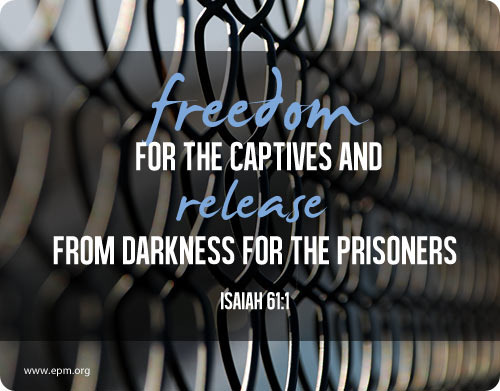 What can you do to get involved in reaching prisoners? You can pray that many men and women in our prison system would come to faith in Christ through the materials being sent out by Biblica, Prison Fellowship, EPM, and other ministries. We would also greatly appreciate prayer that every book EPM sends would be used by the Lord to touch and change lives.
What can you do to get involved in reaching prisoners? You can pray that many men and women in our prison system would come to faith in Christ through the materials being sent out by Biblica, Prison Fellowship, EPM, and other ministries. We would also greatly appreciate prayer that every book EPM sends would be used by the Lord to touch and change lives.
If God lays it on your heart to help partner with our ministry in sending Eternity and my other books to prisoners, you may donate online (choose the option "Books for Prisoners Fund" under Special Funds) or send a check to EPM designated “books for prisoners” on the memo line. 100% of the donations to this fund will be used to finance the cost of the books and materials, as well as the shipping charges. We would love to have you on our prison ministry team!
Then they cried to the Lord in their trouble, and he saved them from their distress. He brought them out of darkness, the utter darkness, and broke away their chains. Let them give thanks to the Lord for his unfailing love and his wonderful deeds for mankind, for he breaks down gates of bronze and cuts through bars of iron. (Psalm 107:13-16)

Related Resources
Book: Eternity
Article: Books for Prisoners
Blog: Sharing the Message of Eternity
Background image credit: saavem via rgbstock.com
November 4, 2013
Are you longing for Heaven?
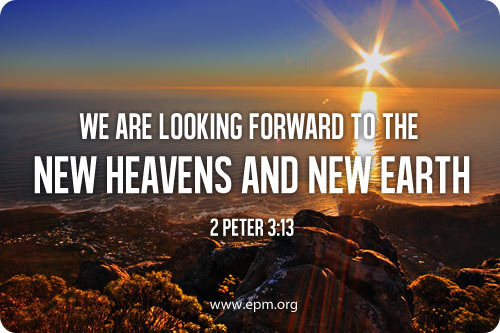 Are you desperately longing for Heaven? It’s a fair question. Abraham “was looking forward to the city with foundations, whose architect and builder is God” (Hebrews 11:10). Abraham’s descendants “were longing for a better country—a heavenly one” (Hebrews 11:16). As Christ’s followers, “we do not have an enduring city, but we are looking for the city that is to come” (Hebrews 13:14). Peter says, “we are looking forward to the new heavens and new earth” (2 Peter 3:13).
Are you desperately longing for Heaven? It’s a fair question. Abraham “was looking forward to the city with foundations, whose architect and builder is God” (Hebrews 11:10). Abraham’s descendants “were longing for a better country—a heavenly one” (Hebrews 11:16). As Christ’s followers, “we do not have an enduring city, but we are looking for the city that is to come” (Hebrews 13:14). Peter says, “we are looking forward to the new heavens and new earth” (2 Peter 3:13).
But, in fact, are we? Are we actually looking forward to and longing for the world to come? This question is critical to our present lives.
For over twenty years, I’ve spent a lot of time contemplating Heaven. In my novels and most of my nonfiction, Heaven plays a major role. Researching my book Heaven, I read over 150 books on the subject, many of them long out-of-print. I’ve spoken on this subject often, taught two seminary courses on eternity, and received literally thousands of letters and emails about Heaven. There’s a great deal I don’t know, but one thing I do know is what Christians think about Heaven. And how seldom we think about it.
What a contrast to the early Christians. Their pictures on the catacomb walls portrayed Heaven with beautiful landscapes, children playing, people feasting at banquets. God’s children throughout the ages had a source of strength and perspective largely alien to us: Heaven. It was their central reference point. It was the North Star by which they navigated their lives. But today, Heaven has fallen off our radar screens.
Who is responsible for our impoverished theology of Heaven? Satan, the father of lies (John 8:44). Some of his favorite deceptions are about Heaven (Revelation 13:6, NIV). He has systematically robbed us of a robust and accurate view of Heaven. And we’ve let him get away with it.
Our children’s imaginations are primed for Heaven, but they’re seldom presented with a compelling picture. So eventually they transfer their excitement and passion toward what they can see, hear, taste, smell and touch, here and now. Because we haven’t shown them the biblical picture of a resurrected humanity on a renovated earth, enjoying the pleasures of God’s presence, creation and culture as we serve King Jesus…they settle for the second-rate idols of a fallen world that’s a mere shadow of what it once was and one day will be. Their hearts are left empty. What they long for is one person, Jesus, and one place, Heaven. Nothing less can satisfy.
What God made us to desire, and therefore what we do desire, is exactly what He promises: a resurrected community life in resurrected bodies, with the resurrected Christ on a resurrected Earth. This is the eternal Heaven that awaits us. How can we think of it so rarely?
We’re slumbering. We need to wake up and smell the New Earth. Taste the coming resurrection. The doctrines of resurrection and New Earth mean that this present world, though suffering under sin and curse, is bursting with clues and foretastes of the world to come.
The Carpenter from Nazareth is preparing a place for us. He knows how to build. He’s constructed entire worlds, billions of them. He’s going to strip the damaged paint off the old Earth, refinish it, and present it magnificent and pristine. He says it will one day be our home . . . and His, for He will dwell there with His people, bringing Heaven to Earth (Revelation 21:3).
So wake up. Imagine this world in its original condition. The happy dog with the wagging tail, not the snarling beast, beaten and limping and starved. The flowers unwilted, the grass undying, the blue sky without pollution. People smiling and joyful, not angry, depressed, and empty. The Curse will be reversed: this is the promise of God (Revelation 22:3). Take it to the bank.
With the Lord we love and with the friends we cherish, believers will embark together on the ultimate adventure, in a spectacular new universe awaiting our exploration and dominion. Jesus will be the cosmic center. Joy will be the air we breathe.
And right when we think “it doesn’t get any better than this”—it will.
So rise up from slumber. Set your mind and heart on a Heaven as exciting as its God. Then feel your heart flutter and watch your perspective change.
You’ll never regret that world you’ll wake up to…not in a billion years.

Related Resources
Video: All Will Be Made Right
Blog: Where God's People Go When They Die
DVD Class: Eternity 101
Photo credit: somadjinn via rgbstock.com
November 1, 2013
Is there a correlation between mental health and spiritual attack?
In this video interview with EPM staff member Julia Stager, we discuss the question: There’s a lot of talk about mental health. How do you see mental health as being related to spiritual attack?
Randy: Mental health was around before people started looking into psychology and there was even such a word. In the Bible, you find people who are mentally healthy and unhealthy. A huge part of our unhealthiness is due to sin and the fact that we are sinners, though not all mental health issues are sinful.
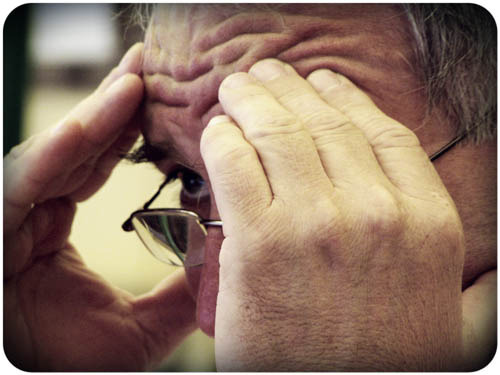 There’s a time when the brain may be malfunctioning, and there may be medications that can help the person. Our mind and our brain are not the same thing, but they overlap. There’s the physical brain, and then we have this spiritual, immaterial thing that is called a mind. We need to do what we can to see that, as Scripture says, our minds are in conformity to Christ: “Do not be conformed to this world, but be transformed by the renewal of your mind” (Romans 12:2).
There’s a time when the brain may be malfunctioning, and there may be medications that can help the person. Our mind and our brain are not the same thing, but they overlap. There’s the physical brain, and then we have this spiritual, immaterial thing that is called a mind. We need to do what we can to see that, as Scripture says, our minds are in conformity to Christ: “Do not be conformed to this world, but be transformed by the renewal of your mind” (Romans 12:2).
Julia: It makes me think of how Jesus addresses our heart, our soul, our minds, and our bodies. It’s important to look at a person as a whole unit, and not just simply address a problem as spiritual. Because if the problem is spiritual, it’s also affecting the rest of that person as well.
Randy: That’s right. And there’s also the aspect of spiritual attack you were asking about. That can be a demonic or satanic attack upon a person. Certainly the evil one and demons can prompt us to think in certain ways. Scripture talks about the influence of the world, the flesh and the devil.
Our society and culture influences us to think in very unhealthy ways about beauty, attractiveness, sex and money. There’s a lot of wrong ways of looking at life that we inherit from our culture. So we’ve got to get back to God’s Word, assemble with God’s people, get wise counsel, and address these issues of mental health in our lives and the lives of our families.

Related Resources
Article: How should a Christian respond to mental illness?
Image credit: oranje88 via sxc.hu
October 30, 2013
Will we drink coffee on the New Earth?
 Both Nanci and I love a good cup of coffee. Actually, I like about three good cups of dark, strong coffee—preferably French Roast, with milk. I'm like one of my fictional characters, homicide detective Ollie Chandler, who drank enough coffee that Juan Valdez named his donkey after him.
Both Nanci and I love a good cup of coffee. Actually, I like about three good cups of dark, strong coffee—preferably French Roast, with milk. I'm like one of my fictional characters, homicide detective Ollie Chandler, who drank enough coffee that Juan Valdez named his donkey after him.
Earlier this year when I wrote the new intro to our book Help for Women Under Stress, I had to confess that though I have lived well by the exercise chapter in the book these past 27 years, I have not been so strict with the nutrition chapter, particularly in reference to the warnings against too much coffee!
And yes, a question I’ve been asked is “Will there be coffee in Heaven?” I’ll address it in this blog not simply for the benefit of coffee lovers but because it’s a revealing test of whether we’re more influenced by biblical teaching or Christoplatonism. Someone may say, “I sure hope there’ll be coffee in heaven.” But it’s a statement that few would attempt to defend biblically.
But consider the facts. God made coffee. Coffee grows on Earth, which God made for mankind, put under our management, and filled with resources for our use. When God evaluated his creation, he deemed coffee trees, along with all else, to be “very good.” Many people throughout history have enjoyed coffee—even in a fallen world where neither coffee nor our taste buds are at their best.
God tells us that he “richly provides us with everything for our enjoyment” (1 Timothy 6:17). Does “everything” include coffee? Paul also says, “For everything God created is good, and nothing is to be rejected if it is received with thanksgiving, because it is consecrated by the word of God and prayer” (1 Timothy 4:4-5). Again, does “everything” include coffee?
Given these biblical perspectives—and realizing that caffeine addiction or anything else that’s unhealthy simply won’t exist on the New Earth—can you think of any persuasive reason why coffee trees and coffee drinking wouldn’t be part of the resurrected Earth?
Will the New Earth have fewer resources for human enjoyment than Eden did or than the world under the Curse offers? If you’re tempted to say, “But in Heaven our minds will be on spiritual things, not coffee,” your Christoplatonism detector should go off. It’s fine if you don’t like coffee, but to suggest that coffee is inherently unspiritual is . . . well, heresy. It directly contradicts the Scriptures just cited. God made the physical and spiritual realms not to oppose each other but to be united in bringing glory to him.
On the New Earth, we will “drink . . . from the spring of the water of life” (Revelation 21:6). God will prepare for us “a banquet of aged wine . . . the finest of wines” (Isaiah 25:6). Not only will we drink water and wine, we’ll eat from fruit trees (Revelation 22:2), and there’s every reason to believe we’ll drink juice made from the twelve fruits from the tree of life. So, along with drinking water, wine, and fruit juice, is there any reason to suppose we wouldn’t drink coffee or tea? Can you imagine drinking coffee or tea with Jesus on the New Earth? If you can’t, why not?
If for health reasons you shouldn’t drink coffee now, then don’t. But aside from personal preference, the only compelling reason for not having coffee in Heaven would be if coffee were sinful or harmful. But it won’t be. If drinking coffee would be unspiritual on the New Earth, then it must be unspiritual now. And unless someone’s a caffeine addict, under bondage to coffee and not to Christ, or if a person’s health is at stake, there’s simply no biblical basis for believing drinking coffee is sinful. Those who shouldn’t consume alcohol or caffeine now will be freed from addiction on the New Earth. Adverse health effects simply won’t exist.
Those who for reasons of allergies, weight problems, or addictions can’t regularly consume peanuts, chocolate, coffee, and wine—and countless other foods and drinks—may look forward to enjoying them on the New Earth. To be free from sin, death, and bondage on the New Earth will mean that we’ll enjoy more pleasures, not fewer. And the God who delights in our pleasures will be glorified in our grateful praise.

Related Resources
Book: Heaven
Video: Heaven and Christoplatonism
Blog: The Problem with Christoplatonism
Stock photo credit: johnnyberg via rgbstock.com
October 28, 2013
What is your opinion of prolife organizations that show graphic pictures of aborted babies?
You can also listen to the audio of this blog.
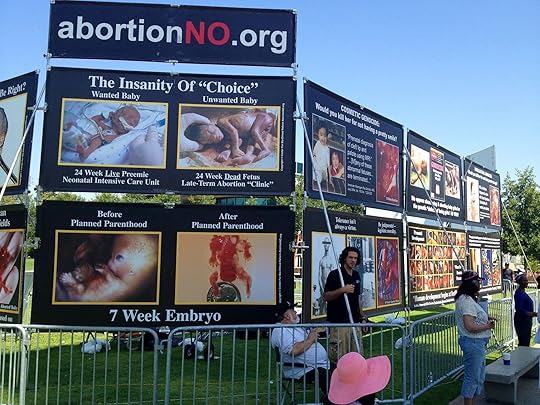 One of the things people from the Center for Bioethical Reform (CBR) do is drive around with trucks showing graphic pictures that include aborted babies. This is not my way of doing it, but I’m fine with that. I think we need to be careful not to criticize other people. It’s like when D. L. Moody was criticized for his evangelism crusades, he said, “Well, I like the way I do evangelism better than the way you don’t do it.”
One of the things people from the Center for Bioethical Reform (CBR) do is drive around with trucks showing graphic pictures that include aborted babies. This is not my way of doing it, but I’m fine with that. I think we need to be careful not to criticize other people. It’s like when D. L. Moody was criticized for his evangelism crusades, he said, “Well, I like the way I do evangelism better than the way you don’t do it.”
And in the prolife arena, I kind of like the way anybody does it, better than the way most don’t do it. Years ago Greg Cunningham, the director of CBR, showed videos called “The Hard Truth,” and “The Harder Truth.” Basically they included actual photos of aborted babies and some live footage, as well as video of an actual live abortion that was filmed.
But before he presented this, he would warn people by saying, “There’s going to be disturbing images and all you have to do is close your eyes. There’s going to be music without narration for this part, so you don’t have to close your eyes and plug your ears.”
But he says it in such a way as to say, “If you’re unwilling to look at the reality of what an abortion is, if you would find this disturbing (and trust me, you will find it disturbing), and you don’t want to look, you need to look.”
Now this does some things which I think are vital. For one, it does bring some people to look who would have turned away, and they no longer can be angry at you (certainly not as angry) because you have warned them. You’ve told them, “You don’t need to watch this.” Now if anyone comes up afterwards and says, “I can’t believe you showed this!” He can say, “Did you not hear what I said? I totally warned you. You didn’t even have to leave the room; all you had to do was look down. You didn’t even have to close your eyes, just don’t look at the screen.”
Now I realize in a documentary, it doesn’t work quite that way. You’re not popping in a DVD. But nonetheless, the narrator could say, “For the next [fill in the blank] seconds, there’s going to be graphic images that portray what an abortion is. You do not have to look at this. Do not look at it unless it is your choice. But if you look away, ask yourself, ‘Why am I looking away?’ It might be that you know that children are being killed by abortion and you’re very aware of this, just as you’re very aware that Jewish people were killed in the Holocaust.” (Or maybe you’ve seen enough of it in the past that you believe it and know it to be true, and this is not going to help move you to further commitment or action on this or whatever.)
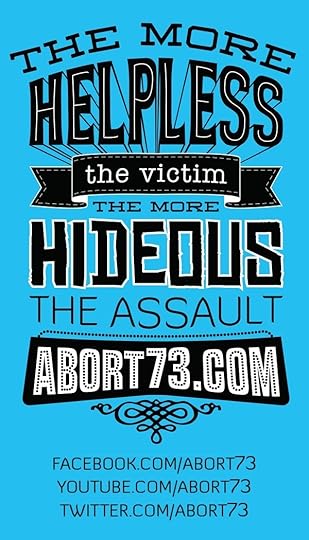 To be honest, I sometimes look away now, because I don’t need any more convincing. I know for sure that this is the killing of the unborn. But even as I say that, it’s healthy for me sometimes to look because it is good to be disturbed again.
To be honest, I sometimes look away now, because I don’t need any more convincing. I know for sure that this is the killing of the unborn. But even as I say that, it’s healthy for me sometimes to look because it is good to be disturbed again.
Many years ago when I wrote a book on civil disobedience called Is Rescuing Right?, I reviewed the history of some pictures taken of the Holocaust that were smuggled out of Germany. They were turned over to The New York Times. Well, The New York Times finally decided that despite how disturbing these images were, to go ahead and print them. That had a huge influence on the attitude of the average American on whether or not it was right to get involved in this war. Once you saw these pictures, you knew how horrible it was.
But the remarkable thing is this—as a whole, nobody stood up and criticized The New York Times. People did not say, “How dare you show us these horrible pictures!” Because the truth is, it’s not the pictures that are horrible. What is horrible is what is in the pictures. This is a critical distinction. I think in a documentary, you’ve got every right and opportunity to say that this is just film. There is nothing good or bad about film—that’s all it is. There’s no evil picture or video. It’s what’s in the video that can be evil.
So if you see evil—like the killing of unborn children—then by all means, recognize it to be evil, but don’t get mad at the people who took the pictures and are showing you the pictures. Get mad at the people who are doing the evil that is in the pictures.

Related Resources
Book: Why ProLife?
Article: Are graphic pictures effective in the abortion debate?
Blog: The Evidence Doesn't Lie - the Unborn Are Children
Photo credit: Center for Bio-Ethical Reform | Graphic credit: Abort73
October 25, 2013
Seven Perspectives on Prayer
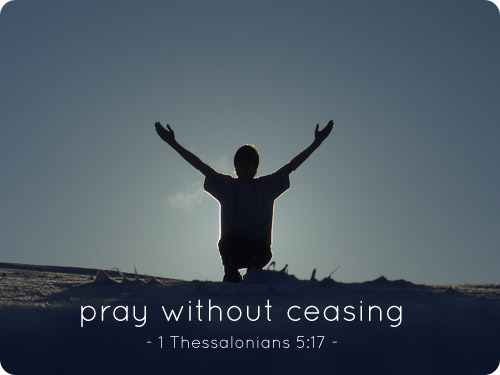
1. Prayer isn’t passive, it’s active. It’s really doing something. Prayer isn’t the least we can do, it’s the most.
2. Prayer is supernatural. It’s reaching out of the visible world into the unseen world, and tapping into powers beyond this dimension. (Prayer picks fights with demons—and empowers righteous angels to win those fights.)
“Our struggle is not against flesh and blood, but against the rulers, against the authorities, against the powers of this dark world and against the spiritual forces of evil in the heavenly realms” (Eph. 6:12).
3. Prayer is never secondary, it’s always primary. It’s not the last recourse, when options run out; it’s the first and best recourse. Prayer is the central work which causes all other work to bear fruit. (No prayer, no power.)
“Therefore put on the whole armor of God...take the sword of the Spirit, which is the Word of God. Pray in the Spirit on all occasions with all kinds of prayers and requests. With this in mind, be alert and always keep on praying for all the saints. Pray also for me, that whenever I open my mouth, words may be given me so that I will fearlessly make known the gospel...Pray that I may declare it fearlessly” (Eph. 6:13, 17-20).
4. God’s greatest works, accomplished through prayer, are often invisible to us for now. (What’s visible to us, except in rare moments of clarity, are not God’s greatest works.)
5. We pray now in faith, believing our prayers are making an eternal difference; we anticipate Heaven, where we’ll learn God’s breath-taking answers to our prayers, including many that seemed unheard and ignored.
6. There is no greater ministry, no higher calling, no better investment than prayer. (It’s not just right, it’s smart.)
7. Prayer is trusting God that He can accomplish more when I’m on my knees than I can accomplish on my feet.

Related Resources
Book: Seeing the Unseen
Article: Perspective on Prayer from Daniel 9-10
Blog: What to Pray for, Beyond Physical Healing
October 23, 2013
The Two Essentials: Grace and Truth
 The only “church growth formula” the early church possessed was the body of truth flowing with the blood of grace. They drew thousands to Jesus by being like Jesus.
The only “church growth formula” the early church possessed was the body of truth flowing with the blood of grace. They drew thousands to Jesus by being like Jesus.
But what does it mean to “be like Jesus”? We could come up with long lists of His character qualities. But the longer the list, the less we can wrap our minds around it. (I can’t even juggle three balls. How could I juggle dozens?)
But what if the character of Christ was reducible to two ingredients?
In fact, it is:
In the beginning was the Word, and the Word was with God, and the Word was God.... The Word became flesh and made his dwelling among us. We have seen his glory, the glory of the One and Only, who came from the Father, full of grace and truth. (John 1:1, 14, emphasis added)
Jesus is full of two things: grace and truth.
Not “full of patience, wisdom, beauty, compassion, and creativity.” In the list there are no commas and only one conjunction—grace and truth. Scripture distills Christ’s attributes into a two-point checklist of Christlikeness.
The baby born in a Bethlehem barn was Creator of the universe. He pitched His tent on the humble camping ground of our little planet. God’s glory no longer dwelt in a temple of wood and stone, but in Christ. He was the Holy of Holies.
But when He ascended back into the wide blue heavens, He left God’s shekinah glory—that visible manifestation of God’s presence—on earth. We Christians became His living temples, the new Holy of Holies (1 Corinthians 3:16–17; 6:19).
People had only to look at Jesus to see what God is like. People today should only have to look at us to see what Jesus is like. For better or worse, they’ll draw conclusions about Christ from what they see in us. If we fail the grace test, we fail to be Christlike. If we fail the truth test, we fail to be Christlike. If we pass both tests, we’re like Jesus.
A grace-starved, truth-starved world needs Jesus, full of grace and truth.
So what does this hungry world see when it looks at us?

Related Resources
Book: The Grace and Truth Paradox
Audio message: Jesus: Full of Grace and Truth
Blog: Better Than I Deserve
From Eternal Perspective Ministries
The Grace and Truth Paradox is on sale in the EPM store for $6 (retail $10.99) until Friday, October 25, 11:59 pm PT.
If we minimize grace the world sees no hope for salvation. If we minimize truth, the world sees no need for salvation. To show the world Jesus, we must offer full-orbed, unabridged truth and grace, magnifying both, never downsizing or apologizing for either.







